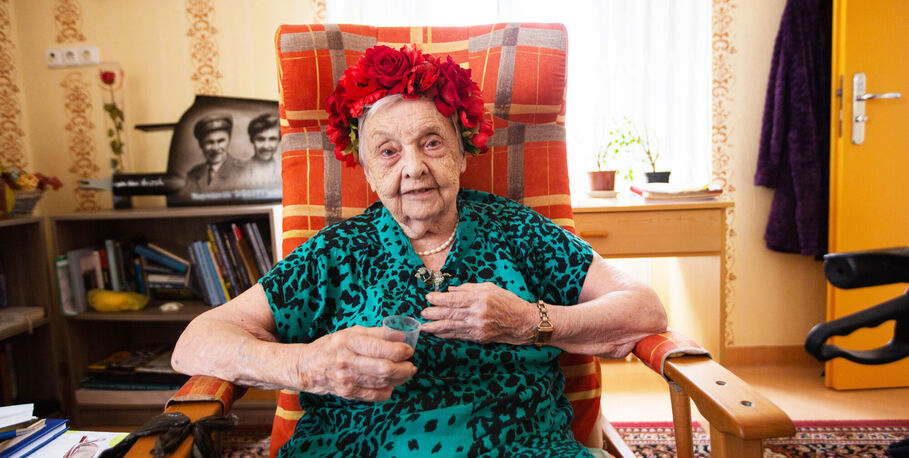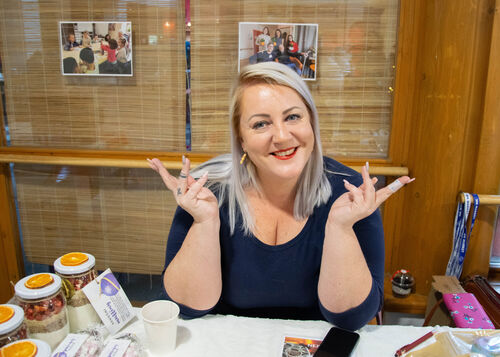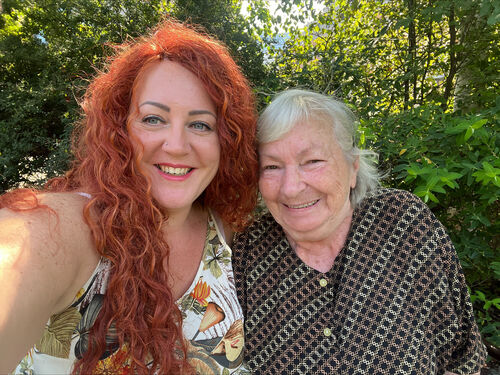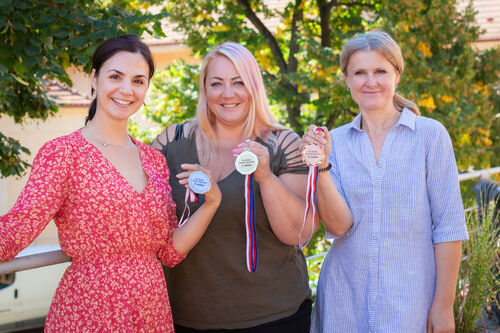“We still picture grandmothers as women baking sweet buns and carrying baskets to the fields. But when you think about it, these are women who once listened to Olympic on cassette tapes and hunted for under-the-counter jeans,” adds Veronika. Where did this distorted image come from?
It’s hard to say. What I notice most today are the worries of people who are approaching retirement age and are afraid they won’t be able to keep their jobs. I see it in my own mother, who’s sixty-two — still strong and employed — and in her peers. The stigma is definitely there, and many employers don’t want to hire older people. Maybe it’s fear of lower performance or outdated work habits. And at the same time, I think Czech society is slowly losing respect and tolerance toward older people.
How do seniors in your care home experience ageing?
Our clients are generally in very old age — eighty, ninety, even a hundred years old, which is a different situation entirely. One reason for this shift is the development of community services that allow seniors to stay at home longer because nurses, care assistants, and personal assistants visit them there. They only come to a care home later in life, already with more serious health issues — and often because their children are elderly too, sometimes already in retirement themselves, and are no longer able to take care of a parent.
We have one client who celebrated her 106th birthday this August. She walks with a frame and she’s absolutely wonderful. But we also have much younger residents who are bedridden.
What drew you to caring for seniors?
After school, I was more attracted to “faster” medicine. I wanted to work in surgery and even considered operating rooms; eventually I ended up in an angiography suite. It was great, but after having two children I wanted a calmer part-time job during maternity leave. In 2018, I came across Sue Ryder completely by accident.
Do you regret not studying ceramics, as you originally dreamed?
I stopped regretting it the moment I wasn’t accepted. I always loved ceramics and I still love creative activities — drawing, painting, crafting — but I can’t imagine making a living out of it.
And you don’t make mugs or vases with the seniors in the care home?
I have wonderful colleagues who come up with amazing activities for our clients, but I personally don’t have much time for it. When Sue Ryder holds children’s bazaars or Christmas markets, that’s when I make bath salts and bake cupcakes with my kids to sell. And my son has a bearded dragon at home, so he visits the seniors with his lizard. My daughter goes along with a colleague from PR who brings her therapy cats.
What does your typical workday look like?
These days it’s mostly paperwork, which I’m not thrilled about. But I join the doctor on ward rounds to stay in touch with our seniors. Sometimes I run into them by chance; other times I stop by the dining room just to talk. Occasionally I visit someone in their room. I’m lucky to have an amazing team of nurses — we have wonderful professional and personal relationships — and above all, we share the same goal: the dignity and comfort of our clients.
For me, a happy senior’s smile means everything. And when someone comes to thank me, or when a family calls to say that their mum is doing better at our home than they ever hoped — that truly warms my heart. It means both the client and their family trust us.
Care homes are sometimes described as dumping grounds. Is that outdated?
I can’t recall a single client being placed with us because their family just wanted to “get rid of them.” Clients must want to come themselves — if someone says, “I don’t want to go anywhere, I’m happy at home,” then that settles the matter. And if a family tries to pressure them, we see it right away during the initial social assessment.
Sometimes it’s simply clear that the person can no longer live safely at home and needs social care — their relatives may be ill themselves or unable to cope. But even then, you cannot view a care home as a dumping ground.
What are today’s seniors like?
Ours are wonderful. They’re motivated and want to stay active — they walk, exercise, look after their health, make friends, and stay connected with their families. They love their children and look forward to every visit. And you can see how much their relatives’ opinions matter to them.
You get to see into their souls — what do they still wish for in life?
It’s hard to generalize. I remember a client in palliative care who dreamed of visiting Mount Říp. Our whole team got involved, and a car drove her all the way up. Many clients light up around animals — cats, dogs, budgies, even a pony that visits sometimes. And they love when children from local schools stop by.
A care home must also see its share of sadness.
Of course. Some clients pass away. But I accept that death is part of life, and that’s what I tell our staff too. We work in a care home for seniors — we need to be prepared to guide clients into palliative care and accompany them at the end. There’s comfort in knowing that someone died the way they wished.
Do they talk about death?
Most clients have it clear in their minds — some even have their funeral prepaid. Others are afraid and don’t want to talk about the end. Our psychologist and chaplain help a lot. Very often we find that they don’t fear death itself as much as the pain before it or how the process will unfold. Everyone wants to die peacefully in their sleep, without pain. We monitor pain closely from the start and address it early with the doctor — there are many options, so no one has to suffer.
What can each of us do to ensure a good old age?
Have an open conversation with your family. Tell them honestly how you feel, what you’re still capable of, and where you’ll need help. No one wants to be a burden, and asking for help is hard. I know this myself — I’ve always tried to manage everything alone, and at work it took me years to learn how to say no and delegate. But sometimes you simply can’t do everything yourself, and you need to accept help — not as weakness, but as an expression of others’ care.
But at the same time, we shouldn’t expect too much from our families, right?
Exactly. Don’t take it personally if they go on holiday. Don’t guilt-trip them for not making you the center of their world. It’s not healthy, and it’s unrealistic.
Some seniors say: I have children — they must take care of me.
That’s true, but it doesn’t always work out. Their children may be ill, overwhelmed, or working full-time. And the key point is: they don’t owe their parents care. Most children do take care of their parents — but it should be their voluntary choice, not a duty driven by guilt. Especially nowadays, when many of us will still be working in our sixties or even seventies.
We sometimes joke with colleagues that our office will one day become another resident room, we’ll just put beds in it and work “from home” lying down. It’s a joke — but also a reminder to stay in good shape as long as possible.
What else should we keep in mind?
Don’t neglect your health so you don’t end up taking twenty pills a day. Preventive checkups matter. I don’t mean running to the doctor with every minor issue, but if you have long-term health problems — like high blood pressure — address them. Physical activity is essential too, whether it’s sport or just regular walks.
How do we cope with the fact that strength declines and things won’t get easier — while still wanting to live, not just exist?
We need reasons to go outside and not stay locked at home with negative thoughts. If you used to cycle a hundred kilometers and now you manage fifty, then maybe in a few years you’ll get an e-bike. The idea is to keep your hobbies or find new ones that work at any age. Try things you’ve never tried before, make new friends — even in senior clubs.
Can old age truly be beautiful, without sugar-coating it?
It depends on how we set our minds. If we lie in bed complaining, criticizing others, and refusing help, then no — our old age won’t be pleasant. Some seniors like that come to us too. The frustration usually comes from anger at themselves for losing independence, and that spills over into their surroundings.
So staying active and learning to accept help are the keys?
Exactly. People who work on themselves — even a little — don’t leave self-reflection for old age. Some come to us unable to walk after a long hospital stay, but they want to walk again. It may look impossible, yet sometimes they succeed. One lady started walking with a tall walker, and she was so proud to make it to the dining room each day — that feeling of “I can still do this” meant everything to her.
We tell clients: we are here for you — ring the bell and we’ll make coffee, help with the bed, anything. But at the same time, we encourage autonomy. If there’s a fall risk, a caregiver goes to the bathroom with them, sets up the shower, hands them the towel — but the washing is up to them. A senior after a stroke, paralyzed on one side, still has the chance to wash or eat with the healthy hand. There’s always a way if the client wants it.
My father used to call his eighty-year-old peers “girls,” and only recently I realized he wasn’t joking.
Do you also see seniors as young souls in old bodies?
When I see them chatting, going out to restaurants together, ordering wine or beer, sometimes arguing and then laughing out loud — I truly believe their spirits remain young. It’s just the body that ages.




